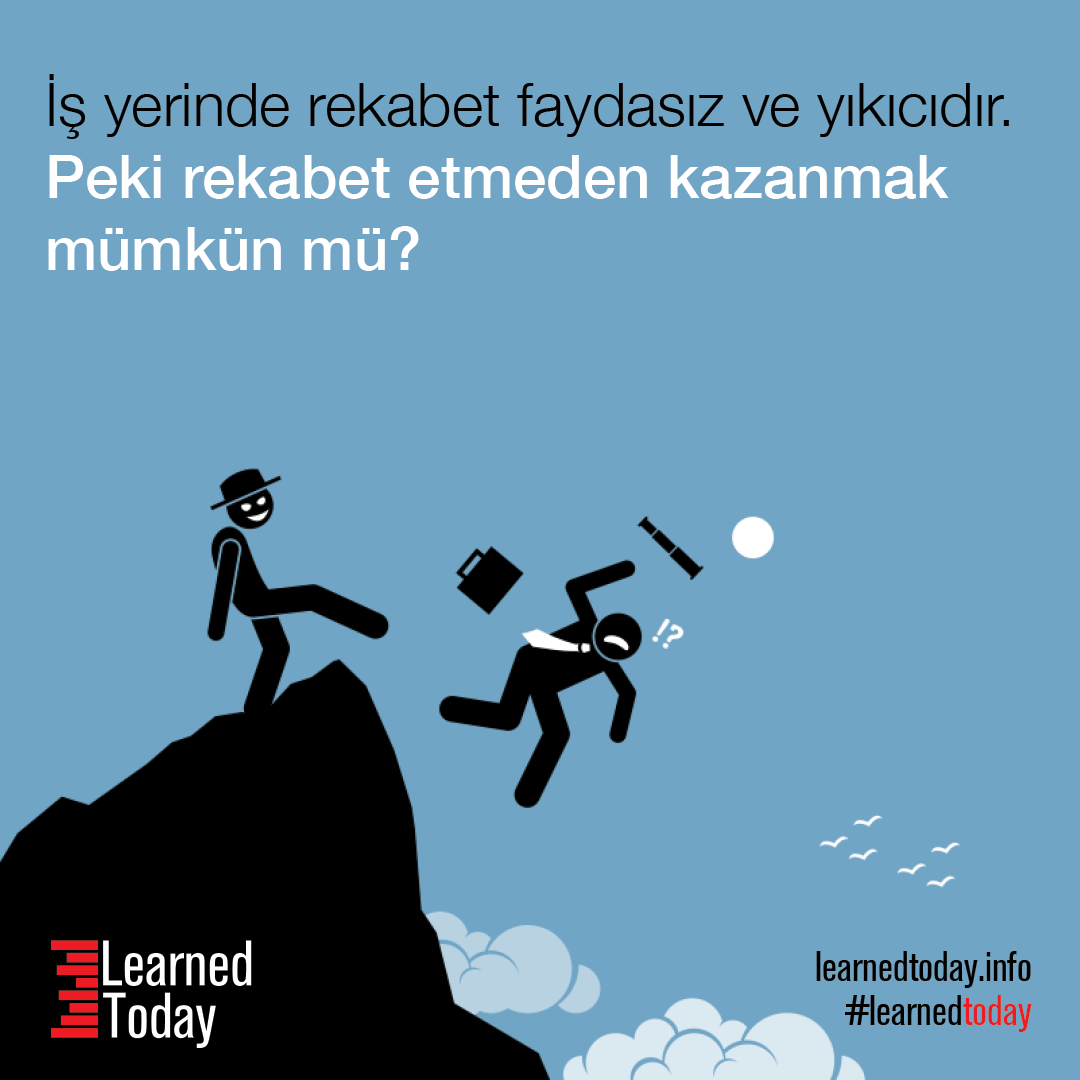
“The more we compete, the less we gain”
Peter Thiel, Zero to One
Everyone should mind her own business! How dare you interfere in my business? We need to watch out for the other team! We are good as we are! I am not indulging with your business, so no one should indulge with mine!
Such and similar phrases are usually avoided to be voiced, still heard at workplace here and there, and they reveal rivalry and defensiveness.
When you care about these words and listen to what is being told, -which are usually served with an accompanying throughout stories from recent past- in case you are not careful, you might suddenly start to see yourself as taking a side. In these stories, everyone is right; whichever side you listen to, that side seems to be right. You either have to choose your side or stay with “who cares” mentality, which basically means “listening” to both sides yet you not minding much about either side.
However, if you pay attention, you will start to feel an absurdity. Yes, only if you pay attention and it will not be automatic, you will need to stop and look, and ask, what does this story really tells me? What’s this defense about? Is another story really not possible? If the sides of this rivalry are people or teams under your management, than paying attention is a must for you. You must realize and you must ask yourself “what’s really going on?”
Defense is described as “capability of resisting attack” (Merriam-Webster Dictionary). Definition itself is pointing out a very interesting absurdity; who is attacking? You are defending, so there has to be an attack, right? So, in this case your work-fellow (!) is the attacker!
Well, why is this defensive status, this rivalry happening? We might try try to find answers by looking at one or more of the following.
First of all, if there is defense there is also fear of losing. I have to defend, attack or run away for not losing because if there is perception of an attack, everything in the brain stops. Let’s repeat, stops, your brain stops, it does not work! Excuse me, let me correct, everything stops but amygdala. Everything else in the brain give way to the great amygdala (indeed its size and its shape is similar to an almond, and actually it means almond in Greek) and amygdala is all alone in the battlefield. However, amygdala to which we own our thousands of years of existence, does only know two things, fight or flight! (hmm, can we say fight or resign when the battlefield is our workplace?)
Secondly, there is the feeling of insecurity. I’m not trusting that my fellow, the other team will fight fairly. I am consciously using the word “fight”, consciously because if we talk about insecurity, perceptually there should also be a fight. My fellow colleague, the other team is my rival. My colleague is not someone that I create, I co-create with, and the team I’m competing with is not my collaborator towards a bigger purpose.
Thirdly, I’m not yet aware of the benefits of co-working and and not even concentrating at my own work instead of rivalry. There is no answer to the question of “what’s in it for me?”. Or, just a second, not the answer, even the question itself does not exist. Does not exist, because I don’t have time, I don’t have energy. My time and energy are spent on the fight; even if I do like to spare some energy nothing is left on my reserves, I’m busy in a sense. Maybe, I do like to act like this, because messing around with others tastes like french fries, you can’t resist, you salt, you dip into ketchup, mustard whatever you like and you keep eating. And, I’m acting childishly, my mother (or father) cooked wonderful dishes, the dinner table looks great, and I’m stubbornly and only eating french fries. All I care! I’m not working with you, I’m not playing with you, I’m not creating…
Fourth, I’m not aware of this: you need to love your colleagues. Months ago, thinking about workplace, I was describing it like this; the demand and expectation around us becoming so extreme and we need a true and diverse support (including emotions) from our colleagues, which is not happening without love. Otherwise, results are very usual, far from being great.
SO, WHAT TO DO?
First of all, ask yourself; what’s this defense all about for God’s sake? What will happen if you don’t defend and refuse to fight? Do you really want your amygdala to manage you? Have you asked? Have you really asked these questions? If yes, you do not need me for the answers, if no, go back to the beginning of this paragraph.
Secondly, stop fighting. Simply dismiss it, drop it. Fight draws you to the bottom, fight is weights you are holding that draws you. Drop it. Drop and rise. Similarly, ‘distrust’ also draws relationships, draws any progress to the bottom. Sucks energy. Which is more preferable to be drawn with distrust and struggle or to stay stable at surface and swim through trust? For a second, let’s assume that the attack continues from the other side (whoever they are), your head is being submerged into the water, your head remains under the water for a while, you struggle and you are up again. Instead of counterattack, what happens if you continue swimming and leave the wrangler behind where he is? Which one do you prefer, fighting childishly and endlessly where you are or progress? Go on and choose one of them!
Thirdly, focusing at your work, becoming better and deeper at what you do will mean that you do increase your uniqueness, your wisdom and insights about it. We’ve just started to swim, now it’s time to catch a flow and start flowing. That will result in arriving earlier where you do intend to arrive. You will be seen astonishingly strong and smooth and as the flow you catch will remain invisible to other eyes. Once you catch this flow, you will also start to realise beauties around the river, you will enjoy and you will have the chance to benefit from those. Still, it is your call if you want keep saying “all I care” and keep eating french fries only. The choice is yours, the choice was always yours, the choice is always yours.
Fourth, just love, what’s the big deal about it? “Loving, everything begins by loving somebody” said Sait Faik, in one of this short stories. Work life is very challenging as it is anyways, how long can it be sustained without love and positiveness? Isn’t it preferable to have hours full of affection and possibilities rather hatred and anger which only bring deadlocks?
In case you are in a leading position, “what to do?” should answer a double meaning for you. First, follow the steps yourself. Second, use all the leadership techniques you know and encourage these steps in your team and in every member of your team.
As a later topic to write about, it’s also possible to define bigger hoops when you look at this rivalry-defense-attack triangle from a bigger perspective. Take the companies in the same industry performing rivalry-defense-attack against each other; could it be resulting in similar harms as in a single organisation, bringing stagnation, hindering progress for the whole industry which inevitably will mean stagnation and inhibition of progress for every single player in the industry? If we like to see even a bigger hoop, can we look at national economies? (Surely if such a thing called national economy still exists against economies of multinational companies). It seems -even though we have some countries who think and play as they are defending against some attacks, positioning themselves as defenders and keeping a rivalry from a nationalist point of view- today, the main players in the world are some companies and few countries -like Singapore- which are focusing at their own progress and advancement. They are not rivaling, quoting Peter Thiel once more, they are not considering competition as a sign of value but as a destructive force.

